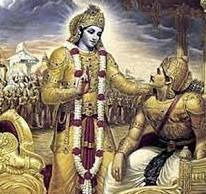5 Lessons from the Mahabharata
- Varsha Vijay
- May 13, 2020
- 3 min read
Updated: May 13, 2020
During lock down, there has been a lot of debate on what the government did right, what it did wrong, what the government should do, what it shouldn’t do etc. But majority of us would agree that it was a wise decision by the Ministry of Information and Broadcasting to re-telecast the popular Ramayana and Mahabharata series from the 80s. As Mahabharata reaches its finale episode, here are a few lessons from the almost 5000 year old epic (3000 BC approx.) that is relevant even in today’s age:

1. Cowards who are unethical and weak will always stab from behind; they lack the courage to fight you up front. This is mostly common today with cowards whom we meet playing petty politics in workplace, “B-schools” or any other place. In Mahabharata, we see Shakuni and Duryodhana avoid a war with the Pandavas but instead challenge them to a game of “Chausar” and win the game using a biased dice.
(Possibly also true in case of China using a biological weapon to defeat US instead of having a direct trade war :D)
2. Do not get into the traps laid by your enemies. Trust your brain over your ego. Yudhishthira did not stop playing the game of Chausar even though he got defeated in the beginning and went on playing only to lose his entire kingdom, brothers and his own wife to Kauravas.
3. Onlookers and bystanders are guiltier than actual culprits. When it comes down to choosing between the right and the wrong, you should not stay quiet or be neutral. In Mahabharata we see some respected and highly honored people like Bhishma Pitamah and Guru Drona not doing anything to stop the “Draupadi Vastraharan". We see that they both meet a painful and an unfortunate end.
4. People who are wrong and unethical will always give excuses and would portray themselves as the victim. You should not feel sorry for them but you should be wise enough to understand that they are actually culprits and not victims. Also, such people will never accept their mistakes but will be ever ready to cry foul when you commit some mistake. The Kaurava Sena killed Abhimanyu by going all against the rules of the war but when The Pandavas bent the rules and killed Dronacharya and Karna, Duryodhana felt it was really unfair.
5. Even if you owe a wrong person something or even if you are closely related to the wrong-doer, still it isn’t enough ground to defend the wrong. Krishna in his famous Gitopadesha advises Arjuna to fight the evil even though many were closely related to both of them. Also Dritharashtra blinded both literally and figuratively by the love for his son Duryodhana, keeps on supporting him even after being fully aware that he was on the wrong path.
Lastly, if we take the main message from the Bhagvad Gita, it would be to do our duty selflessly without any expectations of the result. Yes, the epic gave this lesson much before philosophers like Immanuel Kant mentioned “duty for the sake of duty” and “discharge of duty without self-interest” in his famous theory of “Deontological Ethics”.
Also there can be multiple ways to reach our goals, what is important is we choose the right path. The wrong path may often be the shorter or the easier one but one should always remember that the “means are as important as the end”.


Comments